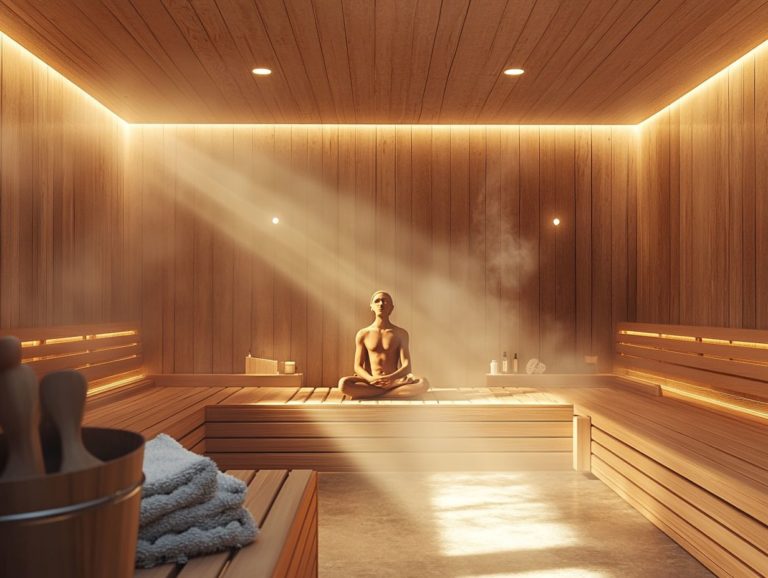Saunas and Mental Clarity: What to Expect
Saunas are often celebrated for their soothing effects on the body, but their influence on mental clarity is becoming increasingly noteworthy. Get ready to discover how saunas can supercharge your brainpower!
This article explores the intriguing connection between sauna use and enhanced cognitive function. You’ll learn how heat impacts the brain, enjoy the mental benefits of stress reduction, and find essential safety precautions to consider.
Additionally, a comparison of traditional and infrared saunas will be provided. You’ll also receive tips on how to seamlessly integrate this rejuvenating practice into your routine for optimal mental clarity.
Whether you’re a seasoned sauna aficionado or simply curious about the experience, you’ll discover how this time-honored ritual can sharpen your mind. Start your sauna journey today for a sharper mind!
Contents
- Key Takeaways:
- The Connection Between Saunas and Mental Clarity
- How Saunas Can Improve Mental Clarity
- Precautions to Take When Using Saunas
- Types of Saunas for Mental Clarity
- Incorporating Saunas into Your Routine
- Frequently Asked Questions
- How do saunas enhance mental clarity?
- How often should I use a sauna for best results?
- What are the potential benefits of using a sauna for mental clarity?
- Can saunas be used as a form of therapy for mental health?
- What precautions should I take before using a sauna for mental clarity?
- Are there risks in using a sauna for mental clarity?
Key Takeaways:

- Regular sauna use can improve mental clarity through its physical effects on the brain and benefits of relaxation and stress reduction.
- Safety precautions should be taken when using saunas, such as staying hydrated and avoiding excessive heat exposure.
- Traditional and infrared saunas offer different benefits for mental clarity, so it is important to choose the type that works best for you.
The Connection Between Saunas and Mental Clarity
The connection between saunas and mental clarity is truly remarkable. Various studies indicate that using a sauna can provide substantial mental benefits, such as improved mood, stress reduction, and enhanced emotional well-being.
By engaging in regular sauna sessions, you can experience an increase in endorphin release, which is essential for alleviating symptoms of anxiety and depression.
Heat therapy improves BDNF levels, promoting the brain’s ability to adapt and grow and overall cognitive performance. In a world where chronic stress often prevails, incorporating sauna therapy into your health regimen is a fantastic way you should try now to boost your mental clarity and resilience.
Exploring the Benefits of Sauna Use
Exploring the benefits of sauna use unveils a host of advantages, particularly for your mental health and relaxation techniques. Regular sauna sessions can work wonders for stress reduction, elevate your emotional well-being, and enhance your overall health by triggering a profound relaxation response in your body.
This unique practice encourages the release of endorphins nature’s own painkillers which can alleviate symptoms of both depression and anxiety.
You ll find that different types of saunas, like the traditional Finnish sauna and the infrared sauna, offer distinct experiences. The Finnish sauna envelops you in high temperatures that promote social connection and deep relaxation, while the infrared sauna operates at lower temperatures, providing a gentler detox and muscle recovery.
The soothing heat from these saunas can help stabilize your mood fluctuations, offering a holistic approach to enhancing your mental well-being.
How Saunas Can Improve Mental Clarity
Using a sauna can greatly enhance your mental clarity through various mechanisms, including improved cognitive function and psychological benefits.
Engaging in heat therapy stimulates the release of endorphins while elevating BDNF levels both essential for the brain’s ability to adapt and grow and cognitive performance.
This results in sharper decision-making and heightened focus, allowing you to navigate challenges with a clearer mind.
Physical Effects on the Brain

The physical effects of sauna on your brain are remarkable. Regular heat exposure enhances blood flow and promotes overall brain health. This process nourishes your brain cells and stimulates the production of proteins that help protect your brain from damage, which are critical in protecting against neurodegenerative diseases like Alzheimer’s and Parkinson’s.
Research indicates that elevated temperatures in a sauna can significantly boost cerebral blood flow, ensuring that essential nutrients and oxygen reach your brain more efficiently. A study published in the journal Age and Ageing found that frequent sauna users had a markedly lower risk of developing dementia. This highlights the long-term protective benefits of consistent sauna use.
This heat stress activates vital protective proteins and helps expel toxic proteins that may accumulate over time. This supports your cognitive function and enhances your brain’s resilience against age-related decline.
Mental Benefits of Relaxation and Stress Reduction
The mental benefits of relaxation and stress reduction through sauna use are impressive. Saunas create an environment that nurtures mindfulness and emotional well-being. By engaging in regular sauna sessions, you can reduce anxiety and stabilize your mood, allowing you to navigate daily stressors with greater ease.
As you bask in the soothing warmth, you ll enter a tranquil state that encourages deep breathing and introspection. This heightened awareness clears your mind, offering a much-needed escape from the chaos of a busy lifestyle.
Incorporating mindfulness techniques like guided visualization or focusing on bodily sensations can elevate your experience. This fosters a deeper connection to yourself. As tensions fade, you’ll find your daily challenges becoming less overwhelming, equipping you with improved resilience to tackle life s ups and downs.
Ultimately, regular sauna sessions provide not just a physical retreat, but also an effective practice for cultivating emotional balance.
Precautions to Take When Using Saunas
When incorporating saunas into your health regimen, it s vital to consider specific precautions for safe and effective heat exposure. Understanding sauna safety practices allows you to maximize therapeutic benefits while minimizing risks linked to excessive use or improper techniques.
Taking these steps lets you fully enjoy the rejuvenating experience of the sauna while prioritizing your well-being.
Safety Measures and Recommendations
Implementing safety measures and best practices is essential to enjoy the health benefits of sauna therapy. For instance, maintaining proper hydration before and after your sauna sessions can enhance your overall experience and the effectiveness of your relaxation techniques.
Choose the sauna type that best suits your health needs be it a traditional wood-burning sauna or an infrared model. It s wise to limit each session to about 15-20 minutes, allowing your body to adjust without the risk of heat-related stress.
After stepping out of the sauna, it s crucial to cool down gradually and replenish the fluids you ve lost with water or electrolyte-rich drinks, which support your recovery and improve your hydration.
By following these guidelines, you ensure safety and maximize the benefits of sauna therapy, leading to better relaxation, reduced stress levels, and enhanced wellness.
Types of Saunas for Mental Clarity

Understanding the various types of saunas is crucial for maximizing your mental clarity and overall health benefits. The primary sauna options, such as the traditional Finnish sauna and the infrared sauna, provide distinct heat therapy experiences.
These unique offerings not only promote relaxation but also significantly contribute to psychological well-being and enhanced cognitive function.
Don’t wait! Start your sauna journey today to boost your brain health and emotional well-being.
Comparing Traditional and Infrared Saunas
When you compare traditional and infrared saunas, you’ll uncover some striking differences in heat exposure and the benefits each offers. Traditional saunas rely on high temperatures and low humidity, while infrared saunas use radiant heat (heat that penetrates deeper into your skin), providing unique psychological and health benefits.
Both types create an inviting atmosphere for relaxation. Traditional saunas typically heat the air to a toasty range of 150 F to 195 F. This encourages you to ease in gradually. In contrast, infrared saunas operate at a cooler 120 F to 140 F, allowing you to enjoy longer sessions without feeling overwhelmed.
This difference in heat can significantly shape your experience. Many people find that the milder warmth of infrared saunas helps them achieve mental clarity more effortlessly. While both sauna types promote cleansing, improved circulation, and enhanced relaxation, your choice often hinges on personal preference and specific health goals.
Incorporating Saunas into Your Routine
Establishing a consistent sauna practice will elevate your mental clarity and overall well-being. By incorporating saunas into your wellness regimen, you not only promote relaxation techniques but also unlock significant health benefits over time, such as enhanced cognitive function and stabilized mood.
Tips for Maximizing Mental Clarity Benefits
- Before you step inside, engage in mindfulness exercises like deep breathing or meditation. This preparation sets a positive tone for your session, allowing your mind to shift into relaxation mode and enhancing your overall emotional well-being.
- Once you re enveloped in that soothing heat, direct your focus toward the sensations surrounding you. This attention deepens your meditative state and helps clear away mental clutter.
- After your sauna experience, don t forget to rehydrate effectively; sipping on water enriched with electrolytes not only replenishes lost fluids but also boosts your cognitive function.
- By establishing a regular routine that incorporates these mindful practices and sauna therapy, you ll gradually cultivate improved mental clarity and enhance your cognitive abilities.

Frequently Asked Questions

How do saunas enhance mental clarity?
Saunas, whether traditional Finnish or infrared, have been shown to improve mental clarity by increasing blood flow and oxygen levels in the brain, as well as decreasing stress and promoting relaxation.
How often should I use a sauna for best results?
The frequency of sauna use varies for each individual, but most experts recommend using a sauna 2-3 times a week for optimal mental clarity benefits, contributing to an overall wellspring of wellness. However, it is important to listen to your body and not overdo it.
What are the potential benefits of using a sauna for mental clarity?
Aside from improved focus and concentration, using a sauna can also help reduce symptoms of relief from depression and anxiety, improve sleep patterns, and increase overall feelings of well-being.
Can saunas be used as a form of therapy for mental health?
There is growing evidence that saunas, particularly heat therapy, can be beneficial for individuals dealing with mental health issues. However, it is important to consult with a healthcare professional before using saunas as a form of treatment.
What precautions should I take before using a sauna for mental clarity?
It is important to stay hydrated and listen to your body when using a sauna. If you have any pre-existing health conditions, it is best to consult with a doctor before using a sauna. Additionally, it is recommended to start with shorter sessions and gradually increase the time spent in the sauna to avoid heat exposure.
Unlock the secrets to improved mental clarity with regular sauna use! By integrating these practices into your routine, you ll experience the full spectrum of benefits that saunas have to offer.
Are there risks in using a sauna for mental clarity?
Using a sauna can have risks, just like any heat therapy. You might face dehydration or overheating, especially if you have certain health conditions.
Always use saunas responsibly. If you’re worried about chronic stress or cortisol levels, talk to a healthcare professional first.






